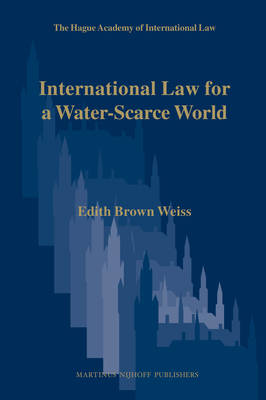
- Afhalen na 1 uur in een winkel met voorraad
- Gratis thuislevering in België vanaf € 30
- Ruim aanbod met 7 miljoen producten
- Afhalen na 1 uur in een winkel met voorraad
- Gratis thuislevering in België vanaf € 30
- Ruim aanbod met 7 miljoen producten
Zoeken
Omschrijving
The fresh water crisis is the new environmental crisis of the 21st century. By 2050, 993 million people are projected to live in cities with perennial water shortages; 3.1 billion will confront seasonal water shortages within their urban areas. The traditional legal principles upon which existing water management is based are likely to be insufficient to deal with the water problems that loom from projected climate change, population growth, food production, increased industrialization, and ecosystem needs.
This volume, a fully revised and expanded version of the lectures given by the author at the Hague Academy of International Law in 2007, focuses on the evolution of international water law in the context of this changing world. Chapter I covers the basic principles of international water law. Chapter II offers a critique of international water law and challenges for the future. Chapter III analyses the evolution of international water agreements over the past two centuries. The analysis draws upon empirical data from more than 2,000 international agreements in a database developed by the author. Chapter IV focuses on the different techniques for resolving disputes and the international fora for doing so. Chapter V considers international institutions associated with international water agreements. Chapter VI addresses the issue of a human right to water and the right of indigenous peoples to water. Chapter VII analyses the implications of international water markets for international trade law, and vice versa, and addresses increasingly important issues associated with virtual water.
This volume, a fully revised and expanded version of the lectures given by the author at the Hague Academy of International Law in 2007, focuses on the evolution of international water law in the context of this changing world. Chapter I covers the basic principles of international water law. Chapter II offers a critique of international water law and challenges for the future. Chapter III analyses the evolution of international water agreements over the past two centuries. The analysis draws upon empirical data from more than 2,000 international agreements in a database developed by the author. Chapter IV focuses on the different techniques for resolving disputes and the international fora for doing so. Chapter V considers international institutions associated with international water agreements. Chapter VI addresses the issue of a human right to water and the right of indigenous peoples to water. Chapter VII analyses the implications of international water markets for international trade law, and vice versa, and addresses increasingly important issues associated with virtual water.
Specificaties
Betrokkenen
- Auteur(s):
- Uitgeverij:
Inhoud
- Aantal bladzijden:
- 360
- Taal:
- Engels
- Reeks:
- Reeksnummer:
- nr. 7
Eigenschappen
- Productcode (EAN):
- 9789004250406
- Verschijningsdatum:
- 15/11/2013
- Uitvoering:
- Hardcover
- Formaat:
- Genaaid
- Afmetingen:
- 168 mm x 244 mm
- Gewicht:
- 725 g

Alleen bij Standaard Boekhandel
+ 683 punten op je klantenkaart van Standaard Boekhandel
Beoordelingen
We publiceren alleen reviews die voldoen aan de voorwaarden voor reviews. Bekijk onze voorwaarden voor reviews.








